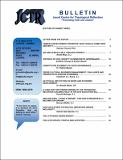JCTR Bulletin 2nd Quarter 2011

View/
Date
2011Author
Jesuit Centre for Theological Reflection
Type
BulletinLanguage
enItem Usage Stats
70
views
views
27
downloads
downloads
Abstract
Three months ago, the constitution making-process in Zambia came to another halt when the proposed
Constitution Bill did not get the two-thirds endorsement it required to pass in Parliament. This was an
inauspicious development for the constitution-making process in Zambia, perhaps signalling yet another failure
by the country to come up with a just and enduring constitution. Various reasons were given for the rejection of
the proposed Constitution. Many people were unsatisfied by both the process and the contents of the Draft
Constitution. Submissions that had been made by the public and by civil society organisations on issues of
critical concern such as electoral regulations and the inclusion of economic, social and cultural rights in the
Constitution’s Bill of Rights were not incorporated into the Draft by the National Constitution Commission. As
such, people felt they had not been listened to.
People and civil society organisations in Zambia have long expressed their wish to see policy changes in both
the political and economic sectors. Examples of some of these advocacy issues are media laws and practices,
the windfall tax, investment laws and employment-related policies. The Government has mostly been
irresponsive to these reasonable demands meant to improve the livelihood of citizens. Such irresponsiveness
erodes public confidence in Government, which will soon be tested in the forthcoming national elections.
Furthermore, the irresponsiveness puts into perspective the dictatorial tendencies of the leaders who
masquerade as champions of democracy. It highlights the difference between real democracy and semblances
of democracy.
